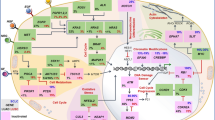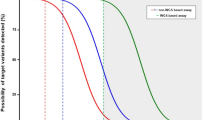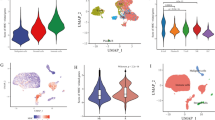Abstract
Cancer treatment using immune checkpoint inhibitors is widely used, although biomarkers predictive of response are not well established. However, both the expressions of programmed cell death ligand 1 (PD-L1) and the tumor mutation burden (TMB) hold promise as such biomarkers for immune checkpoint inhibitors; however, its characteristics and clinical and immunological impacts have not been fully analyzed. We, therefore, evaluated the clinical and immunological parameters related to TMB to identify potential new biomarkers. We enrolled 92 patients with non-small-cell lung cancer who underwent surgery at Fukushima Medical University Hospital from 2013 to 2016. TMB of individual tumors was calculated by whole-exome sequencing analysis. Major cancer-related gene mutations were evaluated using panel sequencing. Expression of PD-L1 and abundance of tumor-infiltrating lymphocytes were evaluated by immunohistochemistry using surgical samples. The median TMB value was 60. TMB was significantly higher in men, current or former smokers, and in patients with squamous cell carcinoma, tumor size ≥ 2.8 cm, wild-type EGFR, TP53 gene mutation-positive status, and cyclin-dependent kinase-inhibitor gene 2A mutation-positive status. According to multivariate analysis, TMB was significantly associated with EGFR gene mutation-negative status (p = 0.0111) and TP53 gene mutation-positive status (p = 0.0425). If TMB is identified as a robust biomarker for immune checkpoint inhibitor administration, analysis of TP53 and EGFR mutations may provide a relatively rapid and easy proxy for predicting TMB.

Similar content being viewed by others
Abbreviations
- MSI:
-
Microsatellite instability
- NGS:
-
Next-generation sequencing
- NSCLC:
-
Non-small-cell lung cancer
- PD-1:
-
Programmed cell death 1
- PD-L1:
-
Programmed death ligand 1
- TIL:
-
Tumor-infiltrating lymphocyte
- TMB:
-
Tumor mutation burden
- TP53:
-
Tumor protein 53
References
Carbognin L, Pilotto S, Milella M et al (2015) Differential activity of nivolumab, pembrolizumab and MPDL3280A according to the tumor expression of programmed death-ligand-1 (PD-L1): sensitivity analysis of trials in melanoma, lung and genitourinary cancers. PloS One 10:e0130142. https://doi.org/10.1371/journal.pone.0130142
Herbst RS, Soria JC, Kowanetz M et al (2014) Predictive correlates of response to the anti-PD-L1 antibody MPDL3280A in cancer patients. Nature 515:563–567. https://doi.org/10.1038/nature14011
Gettinger SN, Horn L, Gandhi L et al (2015) Overall survival and long-term safety of nivolumab (anti-programmed death 1 antibody, BMS-936558, ONO-4538) in patients with previously treated advanced non-small-cell lung cancer. J Clin Oncol 33:2004–2012. https://doi.org/10.1200/JCO.2014.58.3708
Rizvi NA, Garon EB, Patnaik A et al (2014) Safety and clinical activity of MK-3475 as initial therapy in patients with advanced non-small cell lung cancer (NSCLC). J Clin Oncol 32:8007. https://doi.org/10.1200/jco.2014.32.15_suppl.8007
Rizvi NA, Shepherd FA, Antonia SJ et al (2014) First-line monotherapy with nivolumab (Anti-PD-1; BMS-936558, ONO-4538) in advanced non-small cell lung cancer (NSCLC): safety, efficacy, and correlation of outcomes with PD-L1 status: metastatic non-small cell lung cancer. Int J Radiat Oncol Biol Phys 90:S31. https://doi.org/10.1016/j.ijrobp.2014.08.204
Antonia SJ, Gettinger S, Goldman J et al (2014) Safety and efficacy of first-line nivolumab (Anti-PD-1; BMS-936558, ONO-4538) and ipilimumab in non-small cell lung cancer (NSCLC): metastatic non-small cell lung cancer. Int J Radiat Oncol Biol Phys 90:S32–S33. https://doi.org/10.1016/j.ijrobp.2014.08.207
Garon EB, Rizvi NA, Hui R et al (2015) Pembrolizumab for the treatment of non-small-cell lung cancer. N Engl J Med 372:2018–2028. https://doi.org/10.1056/NEJMoa1501824
Rizvi NA, Mazieres J, Planchard D et al (2015) Activity and safety of nivolumab, an anti-PD-1 immune checkpoint inhibitor, for patients with advanced, refractory squamous non-small-cell lung cancer (CheckMate 063): a phase 2, single-arm trial. Lancet Oncol 16:257–265. https://doi.org/10.1016/s1470-2045(15)70054-9
Tumeh PC, Harview CL, Yearley JH et al (2014) PD-1 blockade induces responses by inhibiting adaptive immune resistance. Nature 515:568–571. https://doi.org/10.1038/nature13954
Warth A, Korner S, Penzel R, Muley T, Dienemann H, Schirmacher P, von Knebel-Doeberitz M, Weichert W, Kloor M (2016) Microsatellite instability in pulmonary adenocarcinomas: a comprehensive study of 480 cases. Virchows Archiv 468:313–319. https://doi.org/10.1007/s00428-015-1892-7
Schumacher TN, Schreiber RD (2015) Neoantigens in cancer immunotherapy. Science 348:69–74. https://doi.org/10.1126/science.aaa4971
Rizvi NA, Hellmann MD, Snyder A et al (2015) Cancer immunology. Mutational landscape determines sensitivity to PD-1 blockade in non-small cell lung cancer. Science 348:124–128. https://doi.org/10.1126/science.aaa1348
Carbone DP, Reck M, Paz-Ares L et al (2017) First-line nivolumab in stage IV or recurrent non-small-cell lung cancer. N Engl J Med 376:2415–2426. https://doi.org/10.1056/NEJMoa1613493
Owada-Ozaki Y, Muto S, Takagi H et al (2018) Prognostic impact of tumor mutation burden in patients with completely resected non-small cell lung cancer: brief report. J Thorac Oncol. https://doi.org/10.1016/j.jtho.2018.04.003
Hirsch FR, McElhinny A, Stanforth D et al (2016) PD-L1 immunohistochemistry assays for lung cancer: results from phase 1 of the “blueprint PD-L1 IHC assay comparison project”. J Thorac Oncol. https://doi.org/10.1016/j.jtho.2016.11.2228
Teng MW, Ngiow SF, Ribas A, Smyth MJ (2015) Classifying cancers based on T-cell infiltration and PD-L1. Cancer Res 75:2139–2145. https://doi.org/10.1158/0008-5472.can-15-0255
Rashed HE, Abdelrahman AE, Abdelgawad M, Balata S, Shabrawy ME (2017) Prognostic significance of programmed cell death ligand 1 (PD-L1), CD8 + tumor-infiltrating lymphocytes and p53 in non-small cell lung cancer: an immunohistochemical study. Turk Patoloji Derg 1:211–222. https://doi.org/10.5146/tjpath.2017.01398
Rizvi H, Sanchez-Vega F, La K et al (2018) Molecular determinants of response to anti-programmed cell death (PD)-1 and anti-programmed death-ligand 1 (PD-L1) blockade in patients with non-small-cell lung cancer profiled with targeted next-generation sequencing. J Clin Oncol 36:633–641. https://doi.org/10.1200/JCO.2017.75.3384
Reck M, Rodriguez-Abreu D, Robinson AG et al (2016) Pembrolizumab versus chemotherapy for PD-L1-positive non-small-cell lung cancer. N Engl J Med. https://doi.org/10.1056/NEJMoa1606774
Chen DS, Mellman I (2017) Elements of cancer immunity and the cancer–immune set point. Nature 541: 321. https://doi.org/10.1038/nature21349. https://www.nature.com/articles/nature21349#supplementary-information
Seetharamu N, Preeshagul IR, Sullivan KM (2017) New PD-L1 inhibitors in non-small cell lung cancer—impact of atezolizumab. Lung Cancer (Auckland, N.Z.) 8:67–78. https://doi.org/10.2147/lctt.s113177
Rooney MS, Shukla SA, Wu CJ, Getz G, Hacohen N (2015) Molecular and genetic properties of tumors associated with local immune cytolytic activity. Cell 160:48–61. https://doi.org/10.1016/j.cell.2014.12.033
Spranger S, Luke JJ, Bao R, Zha Y, Hernandez KM, Li Y, Gajewski AP, Andrade J, Gajewski TF (2016) Density of immunogenic antigens does not explain the presence or absence of the T-cell-inflamed tumor microenvironment in melanoma. Proc Natl Acad Sci USA 113:E7759–E7768. https://doi.org/10.1073/pnas.1609376113
Kim HS, Lee JH, Nam SJ, Ock CY, Moon JW, Yoo CW, Lee GK, Han JY (2018) Association of PD-L1 expression with tumor-infiltrating immune cells and mutation burden in high-grade neuroendocrine carcinoma of the lung. J Thorac Oncol 13:636–648. https://doi.org/10.1016/j.jtho.2018.01.008
Blank CU, Haanen JB, Ribas A, Schumacher TN (2016) Cancer immunology. The “cancer immunogram”. Science 352:658–660. https://doi.org/10.1126/science.aaf2834
Karasaki T, Nagayama K, Kuwano H et al (2017) An immunogram for the cancer-immunity cycle: towards personalized immunotherapy of lung cancer. J Thorac Oncol 12:791–803. https://doi.org/10.1016/j.jtho.2017.01.005
Alexandrov LB, Nik-Zainal S, Wedge DC et al (2013) Signatures of mutational processes in human cancer. Nature 500:415–421. https://doi.org/10.1038/nature12477
Van Allen EM, Miao D, Schilling B et al (2015) Genomic correlates of response to CTLA-4 blockade in metastatic melanoma. Science 350:207–211. https://doi.org/10.1126/science.aad0095
Konishi J, Yamazaki K, Azuma M, Kinoshita I, Dosaka-Akita H, Nishimura M (2004) B7-H1 expression on non-small cell lung cancer cells and its relationship with tumor-infiltrating lymphocytes and their PD-1 expression. Clin Cancer Res 10:5094–5100. https://doi.org/10.1158/1078-0432.CCR-04-0428
He Y, Rozeboom L, Rivard CJ, Ellison K, Dziadziuszko R, Yu H, Zhou C, Hirsch FR (2017) PD-1, PD-L1 protein expression in non-small cell lung cancer and their relationship with tumor-infiltrating lymphocytes. Med Sci Monit 23:1208–1216. https://doi.org/10.12659/msm.899909
Takamochi K, Takahashi F, Suehara Y et al (2017) DNA mismatch repair deficiency in surgically resected lung adenocarcinoma: microsatellite instability analysis using the promega panel. Lung Cancer (Amsterdam, Netherlands) 110:26–31. https://doi.org/10.1016/j.lungcan.2017.05.016
Steuer CE, Ramalingam SS (2018) Tumor mutation burden: leading immunotherapy to the era of precision medicine? J Clin Oncol 36:631–632. https://doi.org/10.1200/JCO.2017.76.8770
Garofalo A, Sholl L, Reardon B et al (2016) The impact of tumor profiling approaches and genomic data strategies for cancer precision medicine. Genome Med 8:79. https://doi.org/10.1186/s13073-016-0333-9
Campesato LF, Barroso-Sousa R, Jimenez L, Correa BR, Sabbaga J, Hoff PM, Reis LF, Galante PA, Camargo AA (2015) Comprehensive cancer-gene panels can be used to estimate mutational load and predict clinical benefit to PD-1 blockade in clinical practice. Oncotarget 6:34221–34227. https://doi.org/10.18632/oncotarget.5950
Global Burden of Disease Cancer C, Fitzmaurice C, Allen C et al (2017) Global, regional, and national cancer incidence, mortality, years of life lost, years lived with disability, and disability-adjusted life-years for 32 cancer groups, 1990–2015: a systematic analysis for the global burden of disease study. JAMA Oncol 3:524–548. https://doi.org/10.1001/jamaoncol.2016.5688
Suzuki H, Kawaguchi T, Hasegawa T et al (2006) Prognostic impact of p53 protein overexpression in patients with node-negative lung adenocarcinoma. Cancer Lett 237:242–247. https://doi.org/10.1016/j.canlet.2005.06.014
Acknowledgements
We thank Ms. Kikuta, Ms. Otomo, and Ms. Otsuki for excellent technical support for this study.
Funding
This research did not receive any specific grant from funding agencies in the public, commercial, or not-for-profit sectors.
Author information
Authors and Affiliations
Contributions
YO and HS designed the study. YO wrote the initial draft of the manuscript. SM, DT, HN, JI, TI, and SW contributed to analysis and interpretation of data, and assisted in the preparation of the manuscript. SM, HT, MW, TI, MF, TY, NO, YM, TH, JO, MH, and YS contributed to data collection and interpretation, and critically reviewed the manuscript. All authors approved the final version of the manuscript, and agree to be accountable for all aspects of the work in ensuring that questions related to the accuracy or integrity of any part of the work are appropriately investigated and resolved.
Corresponding author
Ethics declarations
Conflict of interest
The authors declare that they have no conflict of interest.
Ethical approval and ethical standards
This study was approved by the Institutional Ethics Committee at Fukushima Medical University (No. 2538). Whole-exome sequencing by next-generation sequencing was performed in accordance with the Ethical Guidelines for Human Genome and Genetic Analysis Research.
Informed consent
Patients with lung cancer provided written informed consent for the use (including the use for NGS) of tissue specimens and clinical data for research prior to undergoing pulmonary resection at the Department of Chest Surgery of Fukushima Medical University.
Additional information
Publisher's Note
Springer Nature remains neutral with regard to jurisdictional claims in published maps and institutional affiliations.
Electronic supplementary material
Below is the link to the electronic supplementary material.
Rights and permissions
About this article
Cite this article
Ozaki, Y., Muto, S., Takagi, H. et al. Tumor mutation burden and immunological, genomic, and clinicopathological factors as biomarkers for checkpoint inhibitor treatment of patients with non-small-cell lung cancer. Cancer Immunol Immunother 69, 127–134 (2020). https://doi.org/10.1007/s00262-019-02446-1
Received:
Accepted:
Published:
Issue Date:
DOI: https://doi.org/10.1007/s00262-019-02446-1




